Wana Udobang is a versatile artist. She has worked as a radio presenter, movie actor, television and web broadcaster, journalist, poet, and documentary maker, and excelled at them all. In person, she’s funny, incisive, charismatic, outspoken, yet down-to-earth. In a recent conversation about her time in the UK as a student, she switches smoothly between regional British accents, adding dramatic flourish at each instance, to great effect. Wana, as she’s called by friends and colleagues, is a bundle of talents.
For her work, she has been given the International Reporting Project (IRP) fellowship, the Gabriel Garcia Marquez cultural journalism fellowship and the Religious News Foundation grant. Her poems have been featured at the British Library’s Word, Symbol and Song exhibition, and other work of hers have appeared on Al Jazeera, Guardian UK, Guardian Nigeria, Index on Censorship, and Brittle Paper. She was one of the 50 writers and poets invited to the recently-held Kaduna Book and Arts Festival. Something tells me that she’s just beginning.
Wana’s spoken word poetry is one of the things that have kept her in our national consciousness and as one of the most recognized spoken-word artistes in Nigeria today. She is bold yet vulnerable, incisive yet soothing, fierce yet sensual. Her performance has graced the stages of festivals across the continent. After her first album Dirty Laundry was released in 2013, she has now released a second spoken word album titled In Memory of Forgetting.
The album of eleven tracks features a heartfelt and incisive take on social, political, and personal issues and has been described, by this reviewer, as a “feminist dog whistle”. It is more than that. It is one poet’s deft use of personal vulnerability and societal conditioning to scold and to indict.
Naturally, I wanted to talk to her. Here is the result of that conversation.
***
INTERVIEWER
What would most surprise someone coming across your work for the very first time?
WANA UDOBANG
That is so difficult to answer. I am often told I appear very hard and tough, which I completely disagree with but that is conversation for another day. But I don’t think people expect my work to be as emotional. I also think because I am quite bright and bubbly it might be quite surprising that quite a lot of it is can be a bit grim. My work is also very minimalist aesthetically, which is an extension of me. I think as an individual I am constantly living and dealing with a myriad of complexities, so I crave and need simplicity to function and I think those same principles drive my work. I like layered, heavy and complex themes but a minimalist way to communicate the idea. I think that often takes people a bit by surprise.
INTERVIEWER
I find that interesting because I’ve heard some criticisms of Nigerian spoken word that stem from the perception that it is joyless, focusing mostly on grim political realities.
WANA UDOBANG
I suppose for me the personal is political. I am also much more interested in how politicking plays out on the lives of people. I just think we also shouldn’t try to legislate what people want to write about. I am interested in connection and feeling with my work and how people encounter it.
INTERVIEWER
How have people reacted to, and encountered, your work over the years?
WANA UDOBANG
The encounters and reactions have always been very pleasant. Sometimes people cry, sometimes melancholy, sometimes fits of laughter and sometimes just general upliftment. There have also been times when they say sorry I didn’t understand anything you were saying. I absolutely love it when I am performing “Catfish” and the women in the audience shout ‘Amen’.
INTERVIEWER
I’ve seen you perform that poem to electric audience reaction. What inspired the writing of it?
WANA UDOBANG
Asides the fact that I love catfish and I find certain cultural references to be very intriguing like ‘point and kill,’ I was also intrigued by the fact that when an Igbo guy would hit on me he would call me “Asam’ with so much affection and gusto. Just driving on third mainland bridge the words started coming to me as a mother daughter conversation. It was really about this message of feminine agency. So it’s a sort of reminder when you find yourself making certain compromises, pandering, shrinking, or just making decisions that devalue you in any way remembering that your ancestors did not die with all they had to go through for history to keep repeating itself.
INTERVIEWER
What is the biggest challenge to spoken word culture, and performance, in Nigeria today?
WANA UDOBANG
Well I suppose growing the audience and getting to a point where we aren’t the appendage, opening act or interlude to any other art form is still a challenge. So essentially getting to a place where its value is recognized. But we will get there.
INTERVIEWER
Tell me more about In Memory of Forgetting?
WANA UDOBANG
In Memory of Forgetting is really a collection of memories navigating experiences that range from places of brokenness and questioning to self renewal. I really wanted the album to be both thematically and sonically cohesive and I hope we were able to achieve that. I also wanted it to be vulnerable, raw and honest so not layering the poems with too much but really leaving the language simple and very open. It is always very easy hide with poetry. The bones of some of the poems were written as part of a month-long challenge that I was part of in a closed Facebook group. Everyday we got a prompt and had to produce a poem before midnight. It was quite grueling, and I don’t think any of us finished the thirty days but it really opened me up emotionally. I also wrote many of the poems traveling.
INTERVIEWER
How do you rate poetry as a vehicle for social change?
WANA UDOBANG
As Dike Chukwumerije says, “Poetry lends itself quite well to revolutionary angst.” With spoken word, it is also quite immediate making it tailored for urgency.
INTERVIEWER
I loved Open Letter which you did with Títílọpẹ́. How did the poem come together?
WANA UDOBANG
That poem was written, I think, about 3 years ago or so. We had both talked about doing something together when she moved back to Nigeria. I had written this poem called Open Letter and told her I think this would make for a great collaboration. So I sent it to her, she wrote her parts and then edited some bits out so it would fit in seamlessly. The poem was languishing in the inbox for sometime and then last year I called her up that we needed to record it. She was actually confused as she totally forgot about it. We recorded it last year. I asked guitarist Fẹ́mi Lẹ́yẹ to make some music for me and then my producer Lánre Ọládiméjì did the arrangement and we are pretty happy with the result.
INTERVIEWER
Have you done a lot of collaborative work of this nature? I know you were on Adé Bantu’s new album too.
WANA UDOBANG
I haven’t done many, but I really love artistic collaborations. I once did a poem on a track for a rapper called Loose Kaynon. I was part of a performance art piece with artist Wúrà Natasha Ògúnjí as well. I haven’t done many poetry collaborations, but I certainly will.
INTERVIEWER
Who else would you like to work with in the future?
WANA UDOBANG
I would love a to collaborate with a few poets and musicians. Vanessa Kisulle, Indigo Williams, Efe Paul Azino, Lebo Mashile, Koleka Putuma, Mandi Vundla. But the dream music collaboration would be Thandiswa Mazwai and Jill Scott.
INTERVIEWER
Has poetry, or spoken word, always been the preferred choice?
WANA UDOBANG
I was going through lots of family issues as a kid, then throw in the very confusing world that is adolescence. I didn’t know how to process most of it, so I started scribbling things down on paper till, my best friend read some of it and suggested it was quite poetic. She then bought me a journal, and I continued writing and learning. Performance came much later, but I started off writing for the page.
INTERVIEWER
So who are/were your most notable influences?
WANA UDOBANG
I am inspired by all forms of art really, so this is one of those very difficult questions to answer. From Sonia Sanchez, Maya Angelou, Kate Tempest to Charles Causley, Auden, Sexton,Warsan Shire. I love listening to Florence and the machine and Emilie Sande a lot. I think their songwriting is beautiful and stunning poetry. When I started performing I was very into Jill Scott and Floetry. So I think different things move me at different points.
INTERVIEWER
How does one become a successful poet or spoken word artiste?
WANA UDOBANG
I think it starts from writing well, writing honestly. I think performance becomes a tool to convey that message so you become a conduit really.
INTERVIEWER
We were just together at the first edition of the Kaduna Book and Art Festival. What did you enjoy the most about the event?
WANA UDOBANG
KABAfest was a riot. I really enjoyed the fact that I was in a room where many complex conversations that overlap between, tradition, religion and culture was being had and learning about how people were deconstructing and tackling these themes that have a great deal of influence on how they function and live their lives. Then of course just meeting amazing people. I am very illiterate about Northern Nigeria as I haven’t really traveled or lived in the North, so I was just soaking up the whole experience.
INTERVIEWER
What has surprised or challenged you the most about being back in Nigeria?
WANA UDOBANG
I have been back for 8 years. I am quite a free spirit, so I am still not used to the fact that there are so many rules of engagement in Nigeria with how to be as a person. I feel like there are these rules that govern behavior, how to relate to people, just how to be in general.
If you laugh too loudly, speak your thoughts honestly, or just generally expressive, there is a sort of box you are shelved into. Sometimes people can’t be themselves in the way they wish to because there are all these weird expectations of them, which I am often unsure where they come from. I often found it strange this fragmentation of personalities where you have to be a different thing to different people.
Then I am still quite surprised by our status obsession and how much it feeds into our sense of self, identity and security. It often feels like a huge playground and everyone is trying to be part of a gang.
INTERVIEWER
How well will you rate Lagos as a destination for creative endeavor on a 1-10 scale?
WANA UDOBANG
It is certainly a 10 for inspiration. Lagos is sensory overload. For someone like me who is very ideas driven, I have to calm myself down sometimes because there is always some idea that pops up in your head every second just by living here. Just the hustle itself is inspiring, but sometimes all the elements feel like they are colliding against you which is enough to destroy your spirit.
INTERVIEWER
Tell me a little more about your acting career, particularly the film you last participated in in Burkina Faso.
WANA UDOBANG
That was just such a random sequence of events. I had acted a few times but mostly tiny parts in my friends projects either for a bit of fun and also for me to just better understand performance in relation to writing as I had tried to start learning and attempting a bit of screenwriting myself. I got a call from a producer friend to meet this director. We had a meeting where she told me about the movie. he said it would require a bit of traveling. I had quit my job about a month earlier and put it out to the universe that I wanted to travel a lot, and I just thought the universe was answering a little too quick. However I assumed my character was speaking English until I got to Ouagadougou for rehearsals and realized all my lines were in French, and I had never spoken French before. So it was a fun and interesting challenge. I like adventure, so I am always open. The film has gotten great reception at festivals around the world and won a few awards as well. So I can now add francophone actor to my resume. How awesome is that?
INTERVIEWER
Where do you see yourself in the next ten years within the Nigerian and global literary conversation?
WANA UDOBANG
Writing groundbreaking journalism on a bigger scale, creating impactful and globally resonating documentaries, touring the world as a poet performing to hundreds of thousands of people and continuing to find interesting ways to express myself and just create compelling art. In a nutshell, I want to keep innovating and making work that moves people and hopefully moves us to make the world more habitable.
INTERVIEWER
Thank you for your time.
WANA UDOBANG
You are most welcome.
***************
Post images via Wana Udobang’s Instagram.
The album is available for purchase on CDBaby, iTunes, and Amazon.
****************
About the Author:
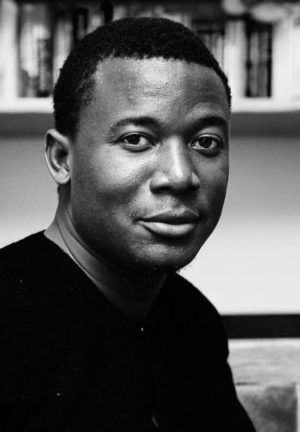 Kọ́lá Túbọ̀sún’s work has appeared in Aké Review, Brittle Paper, International Literary Quarterly, Maple Tree Literary Supplement, and recently in Literary Wonderlands, an anthology edited by Laura Miller. He is the winner of the Premio Ostana “Special Prize” 2016 (awarded in Ostana, Cuneo, Italy) for his work in indigenous language advocacy.
Kọ́lá Túbọ̀sún’s work has appeared in Aké Review, Brittle Paper, International Literary Quarterly, Maple Tree Literary Supplement, and recently in Literary Wonderlands, an anthology edited by Laura Miller. He is the winner of the Premio Ostana “Special Prize” 2016 (awarded in Ostana, Cuneo, Italy) for his work in indigenous language advocacy.


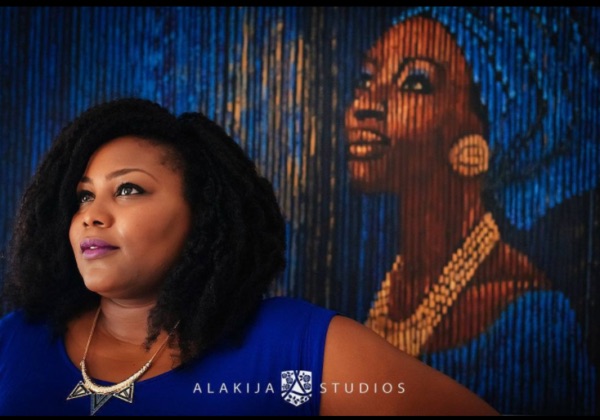

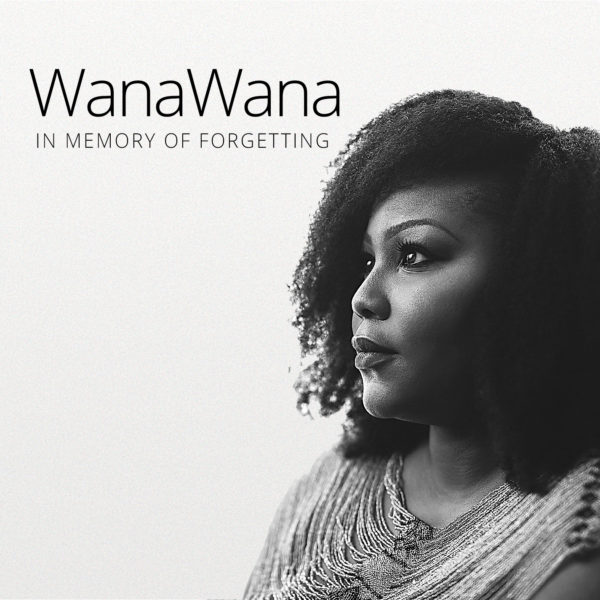
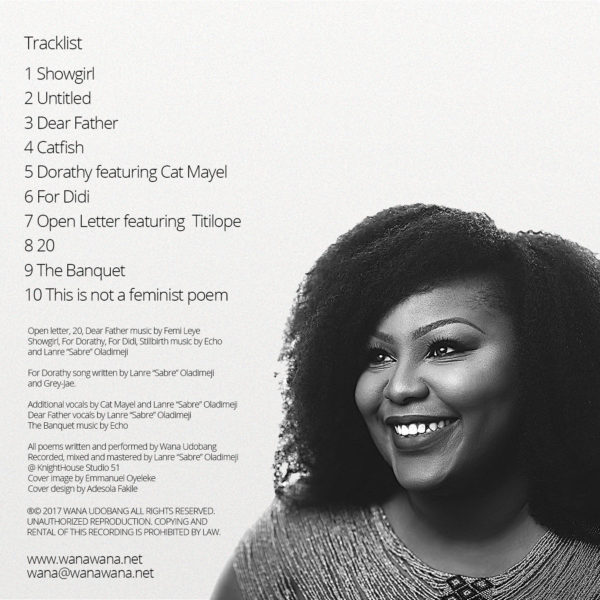



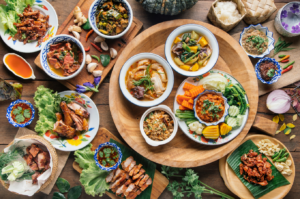
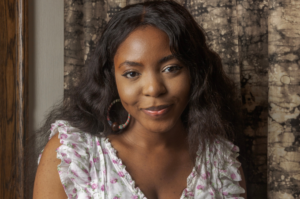



WanaWana Celebrates Love, Sensuality and Feminine Agency « ktravula – a travelogue! September 25, 2017 11:08
[…] sophomore poetry collection called In Memory of Forgetting. I have also spoken with the poet, in an interview published on Brittle Paper, about her work, craft, and opinion on the Nigerian literary scene. So I was glad to see that she […]